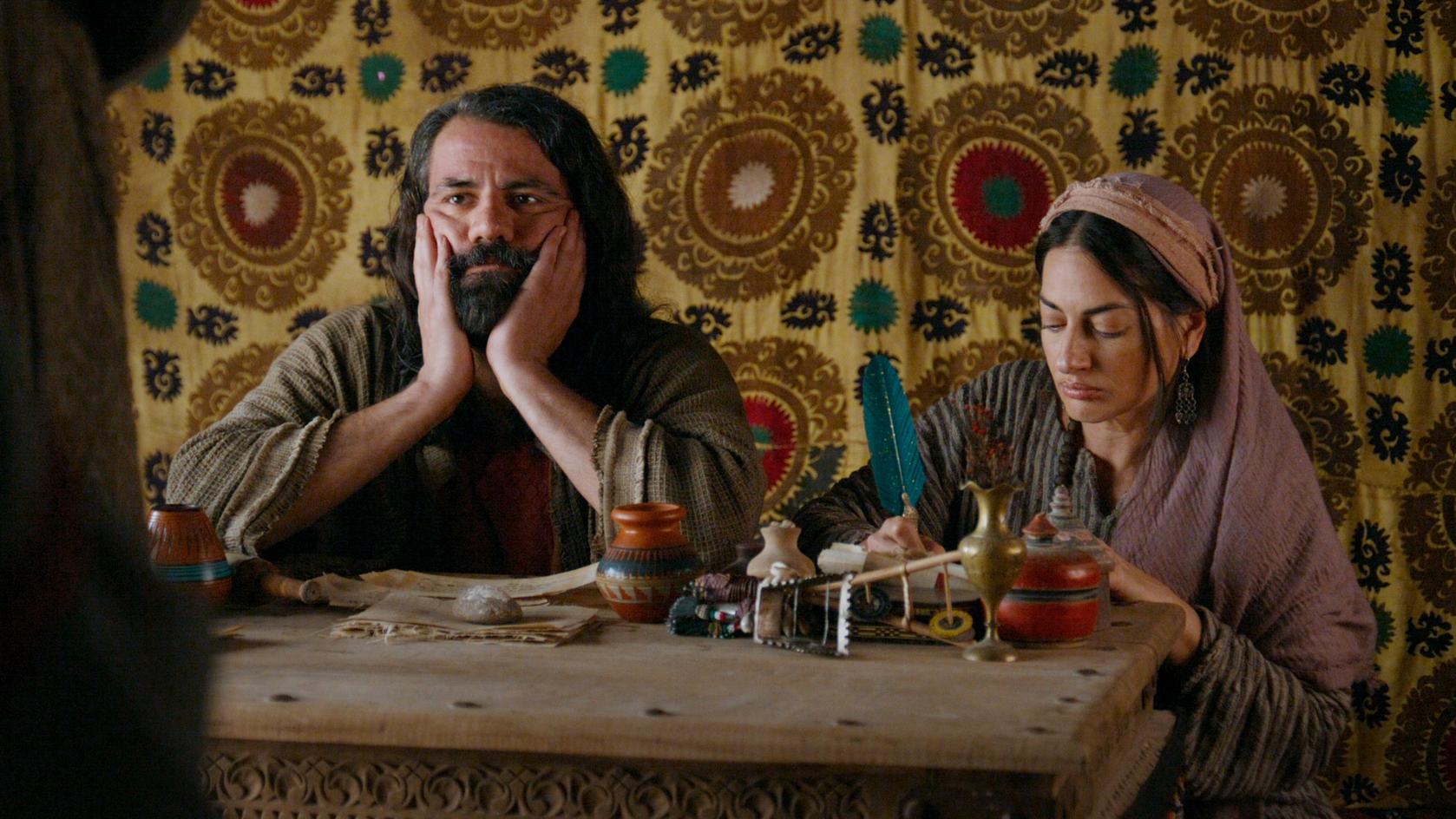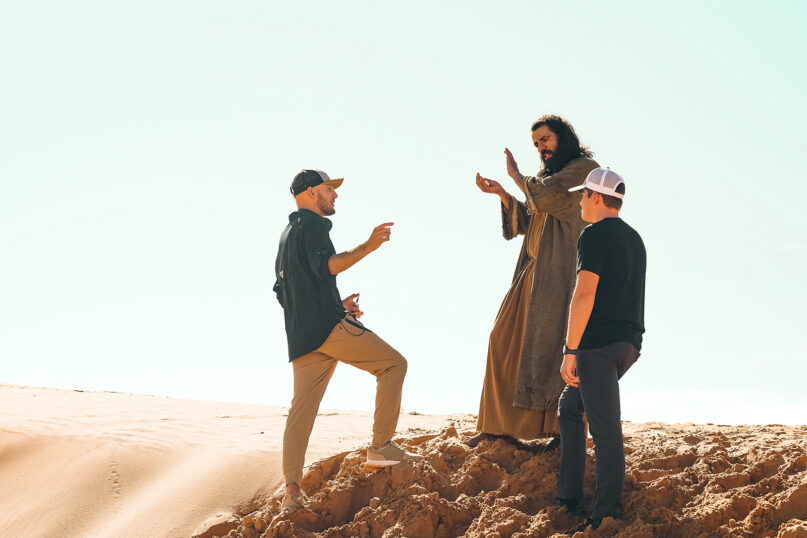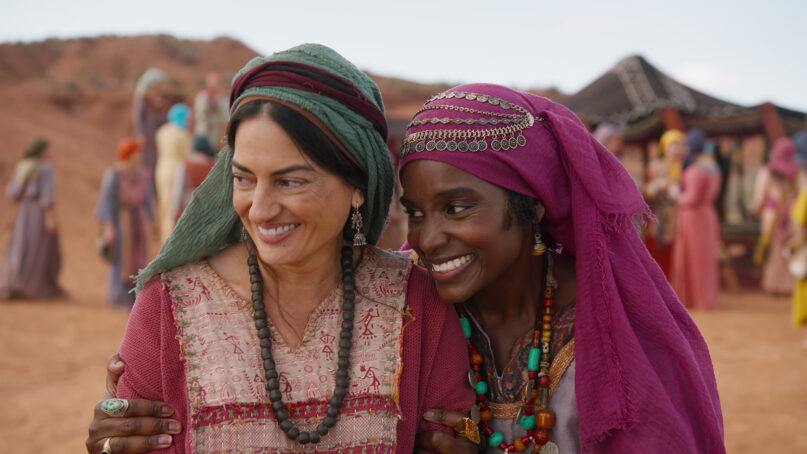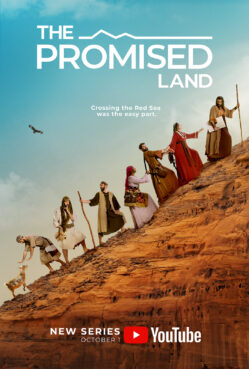
(RNS) — When actor Wasim No’mani was cast as Moses in the new YouTube comedy show “The Promised Land,” it was, for him, a very Moses-like moment.
“Being No. 1 on the call sheet, I was trying not to feel like an impostor, trying not to feel insufficient or inadequate,” No’mani said.
Then, he remembered that Moses, too, struggled with impostor syndrome. “He doubts himself so much that he doubts God. He says, ‘No one’s gonna listen to me. I have uncircumcised lips, I’m slow to speech.’”
Remembering Moses’ very human response was the on-ramp No’mani needed to access the character authentically, he said. And that authenticity is key to what makes “The Promised Land” work. Envisioned as a “mockumentary” series shot in the style of “The Office” and “Abbott Elementary,” the show’s pilot was released last year. And now, its first season, of six episodes out weekly, debuts Wednesday (Oct. 1), tackling the often tragic narrative of Moses and the Israelites with a wink and a nod.

“The Promised Land” writer and director Mitch Hudson, left, with actor Wasim No’mani, center, who portrays Moses. (Photo © Sebastian Molina)
But the humor isn’t derisive. Writer and director Mitch Hudson is a Christian raised on “VeggieTales” and “SpongeBob SquarePants” who strives to remain as true to the source material as possible, while emphasizing the characters’ humanity.
That goal, he told RNS, is one he’s spent years pursuing as a crew member on “The Chosen,” a hit Christian TV series depicting Jesus’ life. Hired in 2018, Hudson is now the show’s second-second assistant director, responsible for directing the background actors. Though “The Chosen” is more dramatic in tone, it’s also known for taking narrative cues directly from Scripture, exploring often-overlooked details and experimenting with new plotlines and characters for added interest.

Shereen Khan as Miriam, left, and Tryphena Wade as Zipporah in “The Promised Land.” (Courtesy photo)
Hudson employs a similar strategy for “The Promised Land,” but the 30-minute episodes also indulge the ironic moments baked into the biblical narrative. The show begins after the Israelites make their dramatic exit from Egypt via the Red Sea. Now in the wilderness, they are focused not just on survival, but how to relate to one another now that they are no longer enslaved. Naturally, chaos and absurdity ensue. The Israelites look to Moses to solve their hilariously random problems. Moses flails in his mission to impress his opinionated father-in-law. Miriam rolls her eyes at not being invited to join Moses on Mount Sinai. The Israelites have a startled reaction to Moses splattering their faces with the blood of the covenant.
“I think what Mitch has done beautifully was being able to find those nooks and crannies where the comedy emanates from our humanity,” said No’mani, who portrayed a Pharisee in “The Chosen.”
Still, the show doesn’t shy away from dramatic and tragic moments. Hudson said he aims for at least 60% comedic content, with the rest of the time spent grappling with more heartfelt or serious moments. In making season one, that became a particular challenge for Hudson in deciding how to depict the golden calf incident. In the biblical narrative, Moses returns after receiving the Ten Commandments from God on Mount Sinai, only to find that the Israelites have created a golden calf to worship. Moses breaks the tablets where the Ten Commandments are written, melts the calf and makes the Israelites drink the mixture. God instructs some of the Israelites to go on a killing spree, and 3,000 people die. The show takes that moment seriously but doesn’t depict the killings.

“The Promised Land” series poster. (Courtesy image)
“It’s a brutal story, it’s a sad story. It’s a story of failure, and it’s a story of being misled,” Hudson said. “So, I wanted to make sure that I found that right balance of showing how brutal this is without overdoing it.”
The Israelites’ patriarchal society is also a counterintuitive fit for comedy. But Hudson’s portrayal deftly pokes fun at sexism without condoning it. He said that while the biblical narrative heavily features the stories of the camp’s male leaders, women were very much present in the camps.
“I knew that I wanted Miriam to be our entryway into that struggle of being in a time period where women are not really given much of a voice,” said Hudson, describing Moses’ sister. That decision was inspired by the Bible, he said, where Miriam is a prophetess known for being outspoken and even rebellious. In “The Promised Land,” she’s often indignant at the ways her potential is overlooked by the men in the group, and her goal is to foster community among women who, in slavery, didn’t have the luxury of spending spare time together.
“The baby my mother pushed down the river became a political revolutionary,” Miriam says sardonically in the show’s trailer. “So now, I get to take notes while the men are talking.”
For some Christians, the harsh moments of the Israelite narrative contribute to their preference for the New Testament. But Hudson said he hopes “The Promised Land” will encourage viewers to return to Scripture and examine some of the Old Testament details that are often brushed over in Christian sermons or Sunday school classes. He also hopes that by leaning into the humanity of the characters, the show will remind audiences that these stories are intended to depict real, flawed people who laughed, felt deeply and faced some of the same interpersonal struggles depicted in modern sitcoms.
“I think, because I’m paying attention to it for the purpose of researching for this show, I have seen God so much more in these stories about Moses,” Hudson said. “These people kept making mistakes, but God still used them over and over.”
